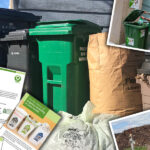St. Paul, Minnesota: Minnesota Composting Economic Impact Study
In 2014, the Minnesota Composting Council conducted the first-ever study of the state’s composting industry. Significant findings include: In 2013, the Minnesota composting industry created an estimated 700 direct, indirect and induced jobs, and was responsible for $148 million in total estimated gross economic activity; Gross revenues from public and private composting organizations totaled $30 million in 2008 and rose to $38 million in 2013, a 27 percent increase; The Minnesota composting industry processed 660,000 tons of organic materials (i.e. yard debris, food waste, agricultural by-products, etc.) into finished soil amendment in 2013. Research for the study was conducted using electronic and paper surveys distributed in Spring 2014 to all Minnesota composting facilities. The study was funded by a Minnesota Pollution Control Agency Environmental Assistance Grant.
On a related note, the City of Minneapolis (MN) will be offering its Minneapolis Solid Waste & Recycling customers the option of green bin curbside organics collection in addition to trash and blue-bin recycling beginning in August 2015. Customers who wish to participate can enroll now. Program implementation will occur in two phases by geographic area based on collection efficiency, beginning with 25 percent of customers in August 2015 and the remaining 75 percent in spring 2016. By requesting customers to sign up early, the City is allowing time to purchase containers and plan collection routes. Accepted organics include all food scraps (including meat, bones and dairy), as well as food-soiled paper, wooden food products like chopsticks and Popsicle sticks, certified compostable plastics and animal and human hair. All organics will have to be placed in certified compostable bags.
Hamilton, Ontario: Commercial Food Scraps Diversion Outreach
In 2013, the City of Hamilton expanded its Green Bin composting service from only residential homes and apartments to businesses the City deemed eligible. At the US Composting Council’s 2015 Annual Conference in Austin, Texas, Jacquie Colangelo, Project Manager in the Waste Management Department for the City of Hamilton, gave a presentation on the strategies used to implement the commercial program, as well as lessons learned. When discussing implementation, Colangelo stated that site visits to businesses were more effective at promoting participation in the program than phone calls, and also provided an opportunity to train staff on the program. Important lessons learned included recognition of communication barriers, for example, staff at businesses where English is their second language. Colangelo also noted that not all businesses have the same operating hours as her department, making it necessary to modify city staff’s working hours on certain days in order to conduct outreach with businesses that work later in the day and at night.
At the end of her presentation, Colangelo mentioned that all of the outreach resources utilized during the rollout of the commercial program are available. To contact Jacquie Colangelo, send an email to Jacquie.Colangelo@hamilton.ca.













